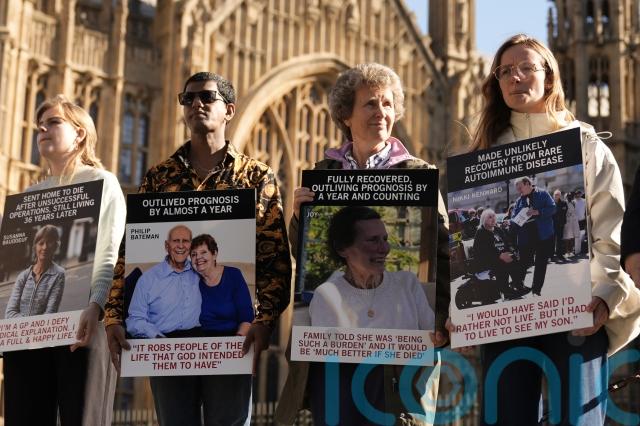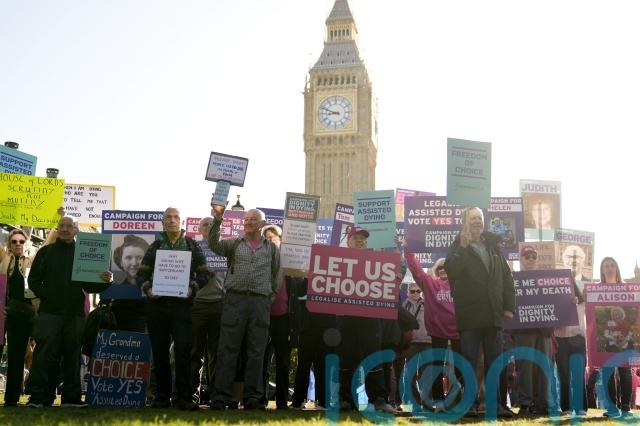
Britain’s equalities watchdog has raised concerns about the assisted dying Bill, calling for more detailed assessment of how the proposed legislation might impact society’s most vulnerable.
Peers packed the red benches of the House of Lords on Friday as members debated the divisive Terminally Ill Adults (End of Life) Bill for the first time.
A record number of speakers are set to take part in a two-day debate, with Lords told at the beginning of Friday’s session they are involved in a “historic occasion”.
As peers began their consideration of the Bill, Labour MP Kim Leadbeater, who introduced the Bill in the Commons last year, could be seen watching from the gallery.
Former lord chancellor and justice secretary Lord Charlie Falconer, who is the sponsor of the Bill in the Lords, said: “The House is full this morning. That reflects the seriousness with which the Lords takes this issue.
“For the first time, we have before us a Bill on assisted dying which has come from the other place (the Commons).
“I know that we will do what we do so well, which is to scrutinise. This is an historic occasion.”
He branded the current law “confused” and said it “causes terrible suffering and lacks compassion and safeguards”.
Demonstrators once again gathered outside Parliament both in support of and in opposition to the Bill – which would apply to England and Wales if it became law.
The Bill’s supporters have described it as one of the safest in the world, requiring an application for an assisted death to be approved by two doctors and an expert panel.
But opponents have raised concerns around possible coercion, a lack of adequate safeguards, and not enough time for such controversial legislation to be properly scrutinised.
In advice to members of the House of Lords, the Equality and Human Rights Commission (EHRC) said more detail is needed on how the Bill could affect people from different backgrounds and those with disabilities.

The commission said: “In our view, to provide effective scrutiny, peers would benefit from more detailed information than is currently available from the (Government impact assessment) about the potential impacts of the Bill on people with different protected characteristics, particularly age, pregnancy and maternity, religion or belief, race and disability (including in relation to mental ill-health).
“This should include relevant evidence about health inequalities between different groups, potential disparities in access to assisted dying between different groups (for example, due to different cultural or religious attitudes), as well as any evidence gaps.”
EHRC chairwoman Baroness Kishwer Falkner raised concerns about the method through which the Bill has been brought to Parliament – as a Private Member’s Bill rather than Government-backed legislation.
The Government has said it is neutral on assisted dying and MPs had a free vote in the Commons debates, meaning they either supported or opposed the Bill based on their own view rather than along party lines.
The Bill has so far been subject to debate in the Commons, as well as line-by-line scrutiny by a committee of MPs.

Baroness Falkner said: “This is complex legislation, with serious implications for equality and human rights in this country. Any assisted dying Bill must uphold everyone’s rights, with safeguards put in place to avoid discrimination against those with protected characteristics.
“We believe that a Private Member’s Bill is an unsuitable vehicle for such significant legislation, because it is not subject to the same pre-legislative scrutiny that a Government-sponsored draft bill would have undergone, with expert evidence considered earlier in the process.
“This summer the UK Government published an equality impact assessment and a human rights memorandum to assist the House of Lords’ consideration of the legislation.
“These important documents were not available to assist MPs’ earlier scrutiny of the legislation, which only reinforces the need for peers to have ample time to consider expert advice carefully and effectively examine the implications of the Bill.”
Ahead of Friday’s debate, Lord Falconer said the proposed legislation will “benefit from the experience and expertise of the Lords, continuing the rigorous scrutiny that has marked this Bill’s passage so far”.
Voicing his confidence the Bill will have time to make its way into law before this session of Parliament finishes in spring, he said: “There is more than enough time for the Lords to scrutinise the Bill and return it to the Commons before the end of the parliamentary session.”
He added that he and Ms Leadbeater “will be very open” to any suggestions peers have for ways the Bill can be “further strengthened and improved”.
He said: “I am sure peers will now fulfil their role with great care and compassion, as they always do.”
The EHRC also raised concerns around the “great difficulty of accurately determining how long someone with a terminal illness will live” and called for more consideration of this issue in the Bill to ensure the legislation “can be effectively and consistently implemented by medical professionals”.
Supporters of assisted dying, including Childline founder Dame Esther Rantzen – who is terminally ill – have appealed to peers not to block the legislation.
Bills are generally not put to a vote at second reading stage in the Lords but peers can call for this, meaning they could vote against the proposed legislation at the end of debate next week.
If this happened the Bill would fall and parliamentary efforts to legalise assisted dying would have to start again.
Supporters say this could mean a chance to change the law would not come before Westminster for another decade – although Conservative MP James Cleverly told a Commons debate earlier this year that this does not have to be a “now or never” moment.
Around 190 peers have put their names down to have their say, and if they all speak across the two-day debate, the number would surpass the previous record of 187 for the EU Withdrawal Bill’s Second Reading in 2018.
Peers will gather again on September 19, for the second part of this stage of the debate.
The legislation would make assisted dying available to adults in England and Wales with a terminal diagnosis of less than six months to live.
Subscribe or register today to discover more from DonegalLive.ie
Buy the e-paper of the Donegal Democrat, Donegal People's Press, Donegal Post and Inish Times here for instant access to Donegal's premier news titles.
Keep up with the latest news from Donegal with our daily newsletter featuring the most important stories of the day delivered to your inbox every evening at 5pm.